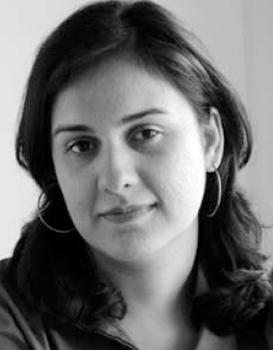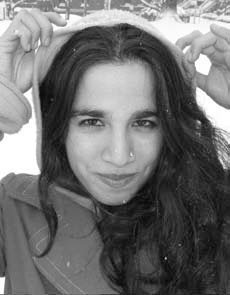And the World Changed (46 page)
Read And the World Changed Online
Authors: Muneeza Shamsie

But I don't believe in bad luck. In fact, if I do everything right, all of this could easily turn around. I could go to England, find her, not get angry with her for running away, promise to love her all my life. I'll tell her that I'll give up the travel agency here, move to Leicester to be with her, and start again there, even if I have to drive a taxi or work in a petrol pump. My parents won't understand, but I don't need them to. When she sees how much I love her, she'll accept me. Maybe then she'll tell me she loves me, and my life will be complete.

Kamila Shamsie

Kamila Shamsie (1973â ) is a novelist who was born and brought up in Pakistan and educated at The Karachi Grammar School. She earned creative-writing degrees in the United States from Hamilton College and the University of Massachusetts at Amherst and has taught at both.
Shamsie is the author of five novels:
In the City by the Sea
(Granta, 1998),
Salt and Saffron
(Bloomsbury, 2000),
Kartography
(Bloomsbury,
2002; Harcourt, 2002),
Broken Verses
(Bloomsbury, 2005; Harcourt, 2005), and
Burnt Shadows
(Bloomsbury, forthcoming 2009; Doubleday, forthcoming 2009). Her books have been translated into several languages. She has won the Prime Minister's Award for Literature and the Patras Bokhari Award in Pakistan and has been short-listed for the Liberaturpreis in Germany and twice for the John Rhys Llewellyn Award in Britain. She has also received the British Council's 70th Anniversary Cultural Relations Award. She has written for many publications, including the
New York Times
,
The Guardian
(UK),
Dawn
(Pakistan), and
The Daily Star
(Bangladesh). After many years of living between upstate New York, London, and Karachi, Shamsie is now based in London.
“The Surface of Glass” tells of a maidservant in a rich household and draws attention to both the uncertainties and limited possibilities that life has to offer people disadvantaged by poverty. This portrayal of psychological trauma illuminates the harsh lives of the poor in Pakistan, but also says much about the human imagination, the power of belief, and the desperate reliance on holy men and superstition for cures when there are no other options.
⢠⢠â¢
The nights when the moon was full were when Razia felt closest to Allah. She wondered sometimes if He, too, felt closest to her on those nights, but then she felt it was wrong to wonder such a thing though she didn't know why. She also didn't know why the new cook hated her so much. But among all the not knowing there was this piece of knowing: that he did hate her.
However that had come to pass, she knew she wasn't to blame. She had given no cause for offense, and in the beginning she was actually glad he was there because he replaced the cook who was a drug addict and always sneezed into the food. Razia's feelings about eating someone else's sneeze were strong, stronger even than her gratitude to the drugged cookâKamal, his name was Kamalâfor always saving the biggest tomatoes for her.
When the new cook arrived he did not sneeze into the food. But he also did not save the biggest tomatoes for Razia. She determined right away that she would like him because it seemed too petty to hate a man for failing to give you the biggest tomatoes. When Razia decided something it was hard for her to undecide it. Many months went by like this, until the new cook was not the new cook any longer, he was merely the cook and he hated her. Why should he hate her? some might ask. It is not a bad question, unless a bad question is one that has no answer. It is obvious that he had nothing to fear from her, and she never turned the burner on high so that his korma burnedâso that eliminates the two most obvious possibilities.
The first time Razia thought of turning the burner on high was when the elder daughter of the family said to her mother, “Why do I need an ayah now, at this age, when I am old enough for lipstick and even a little rouge.” She did not, no would not, would not ever say, and why do I need a cook now? Razia knew this and the cook knew it, tooâso why did the daughter have to say it when he was listening?
But she said it and what is said is said. So the cook knewâand Razia knew he knewâthat cooks are for always and ayahs are for children. That same dayâor maybe not, maybe some days after but at any rate soon enoughâthe thing happened that made Razia undecide what she had earlier decided about liking the cook. The thing that happened was this: Razia was praying and the mother was calling. Razia was trying to pray faster but the mother was calling louder so Razia left the prayer unfinished and went to answer the call. First, though, she turned down one corner of the prayer mat because of the devil. When Razia came back to the prayer mat it was flatânot a wrinkle, not a tassel turned. There was no one in the house except the mother and Razia and the cook. It could only have been himâthat hoarder of large tomatoesâwho smoothened the mat and let the devil sit on it. The devil was not lazy and he was not tired. He did not sit in order to rest his knees, no, he did not. He sat so that he
could suck up the prayers from the mat before they went up to heaven. If Razia had only been praying for larger tomatoes that would have been one thing, but she had been praying for her son's promotion and that was another thing entirely.
Her son was not promoted.
Razia told the devil's helpmate that her son had not been promoted. He said, oh really, well, Allah's will, here have some
keema
. She took the
keema
and started to eat it, but then she stopped. There was another taste in there: not chilli, not cumin, not coriander, not clove, but something else. The elder daughter came into the kitchen and took a spoonful of
keema
straight out of the panâshe was wearing her new clothes that cost as much as Razia's son made in a month in his job without the promotion. Razia saw her put the
keema
into her mouth and thought of that tasteânot cumin, not coriander, not clove, not chilli, but something else. Perhaps that something was poison.
A week later the moon was full. Razia blew prayers around the house, both outside and inside, and then twice around the bed of the younger daughter who didn't wear lipstick yet but one day would, and soon.
There! She had done what she could do, though no one listened to her when she said that when the poisoner chopped onions he was not thinking of onions but of necks. Then she left the house because her unpromoted son was the one person who listened to her and said, you must come away with me now.
But the poison had started working already so Razia was sick when she got to her village. Her son took her to a
hakim
who took the money her son held out to him and said, this is black magic. The
hakim
was short and his teeth were bad but he had many Qurans. There are tall men who cannot say as much. Razia took a Quran from the
hakim
. At first she could not choose which one to take so he pointed to one and she took it. He said, open to the first page. She did. There is a name written here, the
hakim
said, gesturing to a page that was blank save for a sinewy string of letters, indecipherable to her. He read it
out loud and asked, do you know the name? It had been many weeks since she had used the name even in her own mind, and for a moment she didn't recognize it. But then she noddedâtwice, to show the first hadn't just been an involuntary jerk of her head. The
hakim
pointed to the mirrors along the walls and she followed the lazy gesture of his hand and saw the Poisoner's face everywhere, all around her, pressing against each surface of glass.
When she stopped screaming the
hakim
said, There, we have captured the one who did this to you. You are free.
Freedom was tiring. Razia went home and lay down in bed, as she always did at this time. It was just after one in the afternoon. He was serving food and They were eating food. It was good, so good, to have those twenty-odd minutes of rest in the daytime hours with no one saying iron, sew, clean, carry. She lay down in bed as she always did for those twenty-odd minutes; but now it could be twenty moreâwhy not twenty after that ?
Razia closed her eyes. She thought of Him in the kitchen with no one to watch him. She thought of Them at the dining table, their plates piled high. She stretched and smiled and imagined a taste. Not cumin not chilli not coriander not clove.

Bushra Rehman

Bushra Rehman (1974â ) is a poet, essayist, and fiction writer. She was born in Brooklyn, New York, and grew up in Queens. She was educated at the College of New Rochelle, New York; Dominican University of California; and she earned her MFA from Brooklyn College. Her family is originally from the North-West Frontier Province of Pakistan but her father and his relatives lost their land and livelihood when the huge
Tarbela Dam was built. Her family moved to the United States, returning briefly and unsuccessfully to Pakistan when Rehman was in her teens.
Rehman is a coeditor of
Colonize This! Young Women of Color on Today's Feminism
(Seal Press, 2002), and her poetry has been collected in the chapbook
Marianna's Beauty Salon
(Vagabond Press, 2001). Her work has appeared in
ColorLines
,
Mizna
,
Curve, SAMAR, Voices of Resistance: Muslim Women on War, Faith and Sexuality
(Seal Press, 2006) and
Stories of Illness and Healing: Women Write Their Bodies
(Kent State University Press, 2007). She has been featured on BBC Radio 4 and in the
New York Times
and
NY Newsday.
Currently, Rehman is at work on a book about a Muslim community in Queens; “The Old Italian” is an excerpt from an early part of the novel. The story depicts Razia Mirza, a Pakistani girl who is growing up in both the Muslim religion and the culture of a poor, urban neighborhood. Her father and uncles have just founded the first Sunni mosque in New York City. Rehman explores the way neighborhoods in New York City change with each new wave of immigrants and how the children of immigrants internalize the racism they confront in these evolving communities. Rehman shows how an immigrant community clings to age-old customs even though they are divorced from the living fabric of their homeland.
